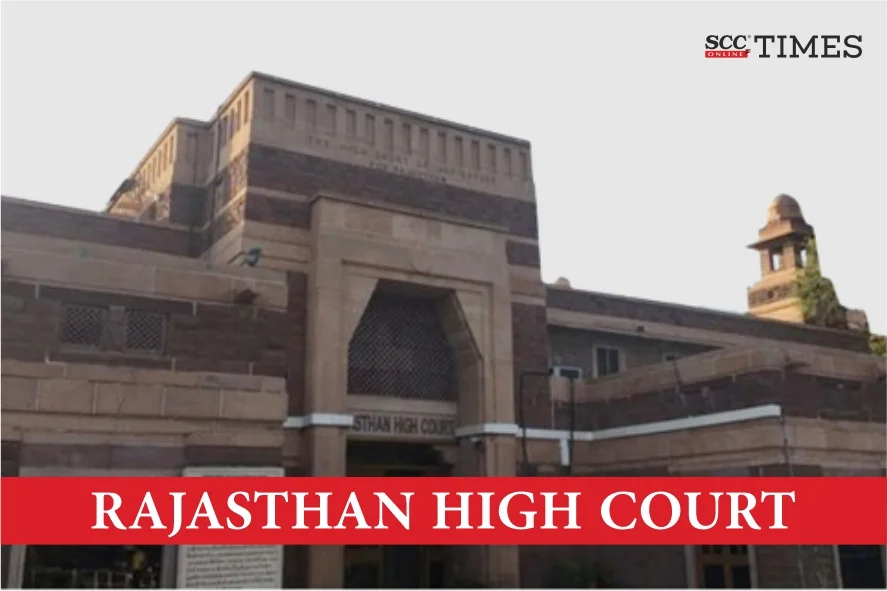Rajasthan High Court: In an appeal filed by State of Rajasthan challenging the Additional Sessions Judge’s judgment of acquittal under Sections 302 and 304-B of the Penal code, 1860 (IPC) pertaining to murder and dowry death, but convicted the accused under Section 498-A IPC for cruelty, a Division Bench of Sunil Beniwal and Dr. Pushpendra Singh Bhati,* JJ., upheld the acquittal of the accused under Sections 302 and 304-B IPC as prosecution failed to prove its case beyond reasonable doubt. The Court reiterated that in appeals against acquittal, the appellate court must respect plausible views taken by the trial court unless they are perverse or manifestly illegal.
Brief Facts
In the instant matter, the complainant’s daughter was married to respondent approximately 11 months before the incident. According to a written complaint filed on 04-04-2007, the complainant’s daughter was subjected to dowry-related harassment by her husband, mother-in-law and sister-in-law. Three months after marriage, her daughter returned to her paternal home due to such harassment. Two months prior to the incident, following an assurance by a relative and the in-laws that no further dowry demands or cruelty would occur, her daughter returned to her matrimonial home.
On 03-04-2007 at around 8:30 p.m., the complainant received information that her daughter had been set on fire by the accused. She was admitted to the hospital. Before her death, she allegedly named the accused as perpetrators. A case was registered under Sections 498-A and 304-B IPC. Later, Section 302 IPC was added. After the trial, the trial court acquitted the accused under Sections 302 and 304-B IPC but convicted them under Section 498-A IPC. The State of Rajasthan preferred this appeal against the acquittal.
Moot Points
- Whether the acquittal of the accused under Sections 302 and 304-B IPC justified?
- Whether the circumstantial evidence sufficiently proved the guilt of the accused beyond reasonable doubt?
-
Whether the judgment of the trial court suffered from any legal perversity warranting reversal?
Parties’ Contentions
The prosecution contended that the trial court erred in acquitting the accused under Sections 302 and 304-B IPC despite convicting them under Section 498-A IPC on the same set of evidence. It was contended that the witnesses, including father, mother, sister and relative, consistently testified about the dowry demands and cruelty. The prosecution emphasised that the testimony and statement under Section 164 CrPC by the deceased pointed to homicide, not suicide.
However, the respondents argued that the deceased’s Section 164 CrPC statement was uncorroborated and lacked medical certification of her mental fitness, rendering it unreliable. It was emphasised that the accused themselves took the deceased to the hospital, indicating no mens rea. It was argued that no eyewitness was presented, and the postmortem report revealed no signs of struggle, thereby supporting the theory of suicide. It was lastly contended that following a compromise two months before the incident, there was no evidence of any fresh dowry demand or cruelty “soon before” her death, an essential ingredient under Section 304-B IPC.
Court’s Observations
The Court observed that after appreciation of the evidence, the trial court found sufficient ground to convict the accused under Section 498-A IPC, acknowledging the existence of cruelty in the marital relationship.
The Court noted the lack of direct or ocular evidence and observed that the case under Sections 302 and 304-B IPC rested entirely on circumstantial evidence. The Court noted that the deceased’s statement under Section 164 CrPC lacked corroboration and was unsupported by a medical fitness certificate, especially considering her critical burn condition.
The Court relied upon the five golden principles laid down by the Supreme Court in Sharad Birdhichand Sarda v. State of Maharashtra, (1984) 4 SCC 116, to assess circumstantial evidence and found that —
“The prosecution has failed to establish a complete and unbroken chain of circumstances which could irresistibly point towards the guilt of the accused-respondents.”
Further, on the applicability of Section 304-B IPC, the Court relied on Satbir Singh v. State of Haryana, (2021) 6 SCC 1 and observed that the term “soon before” necessitates a “proximate and live link” between cruelty and death. The Court stated that the testimonies did not convincingly establish cruelty or dowry demands “soon before” the death, a sine qua non for a conviction under Section 304-B IPC. The Court held that essential ingredients of Section 304-B IPC, particularly the requirement of cruelty “soon before death”, are not satisfied.
“No specific or cogent evidence has been brought on record to show that any demand of dowry or act of cruelty occurred subsequent to that compromise and proximate to the death of the deceased.”
The Court referred to Mallappa v. State of Karnataka, (2024) 3 SCC 544 and Babu Sahebagouda Rudragoudar v. State of Karnataka, (2024) 8 SCC 149 and reiterated that an acquittal can only be reversed if the trial court’s findings are perverse, based on misreading of evidence, or result in miscarriage of justice.
The Court asserted that the scope of interference in the acquittal order passed by trial court is very limited, if all the evidence is thoroughly analysed and the court arrives at a legally plausible view. The Court asserted that “mere possibility of a contrary view shall not justify the reversal of acquittal.” The Court held that “the impugned judgment deserves no interference by this Court in the instant appeal.”
Court’s Decision
The Court held that the prosecution failed to prove its case under Sections 302 and 304-B IPC beyond reasonable doubt and upheld the trial court’s judgment of acquittal. The Court directed the accused to furnish bail bonds of Rs. 25,000/- each under Section 437-A CrPC to secure their presence in case of further appeal.
[State of Rajasthan v. Jadawali, 2025 SCC OnLine Raj 2690, Decided on 16-06-2025]
*Judgment by Justice Dr. Pushpendra Singh Bhati
Advocates who appeared in this case :
Mr. Ramesh Dewasi, PP, Counsel for the Appellant
Mr. Vikram Choudhary, Counsel for the Respondents



